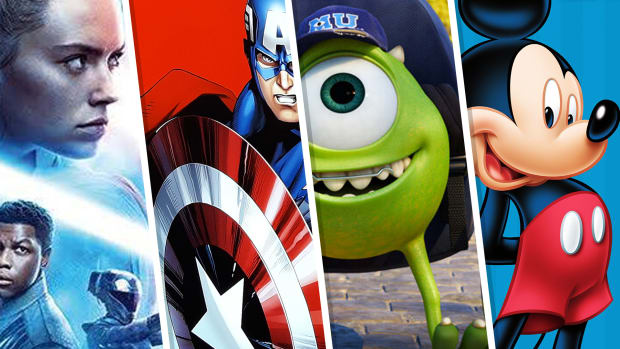
Before the covid pandemic, Walt Disney (DIS) had a reliable and predictable model for its movie business.
The company essentially had seven or eight billion-dollar box office films each year. The makeup might vary a little, but the Mouse House could release three Marvel movies, two Pixar films, one live-action remake of a classic animation film, and a Star Wars movie.
Add in a wild card, like a movie based on a Disney World ride ("Jungle Cruise" or "Pirates of the Caribbean" are good examples) and you had a predictable formula.
Yes, it might put out the occasional relative dud like "Solo: A Star Wars Story," or a Pixar film that misfires a bit, but Disney was the model of consistency. Basically, every film it released (with a few intentional exceptions) had a good shot at $1 billion at the global box office.
No other studio could claim that and no rival came anywhere close to Disney's portfolio of intellectual property.
This almost unassailable model hinged on people wanting to go to the movies but being willing to consistently pay only for well-known name-brand content. That gave Disney a major edge as it could mine its IP for new characters that lived in the same universe as familiar ones. You may not know "Ant-Man," but he's sort of friends with Iron Man, and kind of knows Spider-Man, and that was enough.
Now, however, in the post-pandemic world, the bar has been raised. It takes more than a familiar character to get people to visit a movie theater, it takes a full-on event, and even then, returns are generally not what they once were.

Disney/Marvel/Pixar
Disney Faces a Dismal Box Office Future
Covid changed what may have been an already dying movie business. It's hard to get someone to pay for a ticket to a movie, when a few months later the film will end up on a streaming service that costs less for a month than the single theater ticket did.
Global box office peaked in 2019 at $42.3 billion. You can throw out 2020 and 2021 numbers due to covid, but that's a number the industry will likely never see again.
"Taking a look ahead to 2023, Gower Street Analytics is projecting global box office to hit $29 billion, repping a 12% gain on 2022 should this year remain on track for approximately $25.8 billion. The London-based firm estimates 2022 receipts stood at $23.6 billion as of Dec. 10," Deadline reported.
This year's haul will come in about 44% off the all-time peak, which next year will improve on slightly. But that does not really change the equation for Disney.
The reality is that Pixar movies are no longer sure things. "Lightyear" and "Strange World" both bombed at the box office. That's likely because families don't see the value in going to theaters and paying those prices when they could just wait to watch the movie at home on a service they already pay for.
The bigger problem may be that the ceiling for hit films has gotten lower. "Black Panther: Wakanda Forever" made $787 million in global box office while the original made $1.38 billion. "Avatar: The Way of Water" is also very likely to dramatically underperform the $2.7 billion the original film made.
And, yes, "Doctor Strange in the Multiverse of Madness" did add about $300 million in box office compared with its predecessor. But when you look at box-office trends (not just Disney), that's the exception, not the norm.
Disney Has to Change Its Model
Returning Disney CEO Bob Iger fully understands that the theatrical movie business will never fully recover. That may not matter for the biggest of blockbusters, but the days of family-friendly movies driving billion-dollar theatrical returns seem over.
Disney brought in just over $11 billion in global box office in 2019. The Mouse House has crossed $3 billion in 2022, leaving an $8 billion divide. Even if you assume that 2023 will improve, the company still faces a massive deficit that should impact how it decides to make films going forward.
While Disney shares its box-office revenue with the theaters that play its movies, billions in revenue simply won't come in anymore. That means the company needs to cut expenses while also balancing which films will still make financial sense in theaters.
That's likely to mean fewer theatrical releases and an overall slowdown in content. Disney needs enough movies and television shows to retain Disney+ subscribers while also adding new ones. As the company maxes out that subscriber base, it's likely its content needs go down.
Disney can hold its streaming customers by making sure there's one show at a time that serves each core audience. It can also save the biggest blockbusters for theaters, which might make those even bigger events.
It's a changing model, and spending cuts are likely needed, but the Mouse House has the intellectual property it needs to tell great stories, and Iger should be able to figure out how to make that work financially. Ultimately, Disney probably needs to make less content and lower budgets on some of its movies. Consumers may not like that, but if they're paying for tickets, they don't really have a say.







